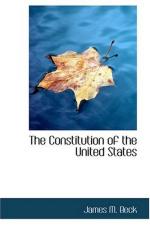Having thus determined the general principles that should guide them in their labours, the convention, on July 26 appointed a Committee on Detail to embody these propositions in the formal draft of a Constitution and adjourned until August 6 to await its report. That report, when finally completed, covered seven folio pages, and was found to consist of a Preamble and twenty-three Articles, embodying forty-three sections. The draft did not slavishly follow the Virginia propositions, for the committee embodied some valuable suggestions which had occurred to them in their deliberations. Nevertheless, it substantially put the Virginia plan into a workable plan which proved to be the Constitution of the United States in embryo.
When the committee on detail had made its report on August 6, the convention proceeded for over a month to debate it with the most minute care. Every day for five weeks, for five hours each day, the members studied and debated with meticulous care every sentence of the proposed Constitution. Time does not suffice even for the barest statement of the many interesting questions which were thus discussed, but they nearly ran the whole gamut of constitutional government. Many fanciful ideas were suggested but with unvarying good sense they were rejected. Some of the results were, under the circumstances, curious. For example, although it was a convention of comparatively young men, and although the convention could have taken into account the many successful young men in public life in Europe—as, for example, William Pitt—they put a disqualification upon age by providing that a Representative must be twenty-five years of age, a Senator thirty years of age, and a President thirty-five years of age. When it was suggested that young men could learn by admission to public life, the sententious reply was made that, while they could, they ought not to have their education at the public expense.
The debates proceeded, however, in better temper, and almost the only question that again gave rise to passionate argument was that of slavery. The extreme Southern States declared that they would never accept the new plan “except the right to import slaves be untouched.” This question was finally compromised by agreeing that the importation of slaves should end after the year 1808. It however left the slave population then existing in a state of bondage, and for this necessary compromise the nation seventy-five years later was to pay dearly by one of the most destructive civil wars in the annals of mankind.
August was now drawing to a close. The convention had been in session for more than three months. Of its work the public knew nothing, and this notwithstanding the acute interest which the American people, not merely facing the peril of anarchy, but actually suffering from it, must have taken in the convention. Its vital importance was not under-estimated. While its builders, like all master builders, did “build better than they knew,” yet it cannot be said that they under-estimated the importance of their labours. As one of their number, Gouveneur Morris said: “The whole human race will be affected by the proceedings of this convention.” After it adjourned one of its greatest participants, James Wilson, of Pennsylvania, said:




